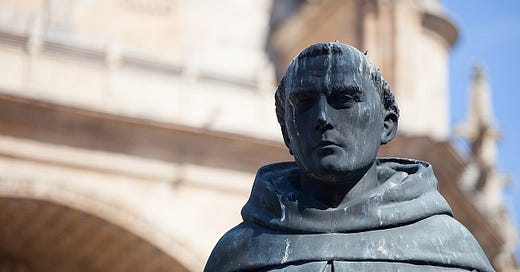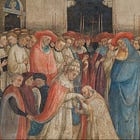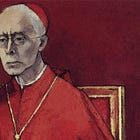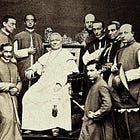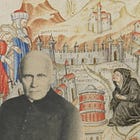Papal elections without the cardinals? – Francisco de Victoria OP
It's sometimes said that if all cardinals died, defected or disappeared during a vacancy of the Holy See, there would be no way to elect a new pope. Dominican Theologian de Victoria explains.

Editor’s Notes
This is a continuation of our series Papal Elections Without Cardinals? This series is presenting various opinions proposed as to how the Church could elect a new pope in the absence of the normal electors.
This present text is from the work The Great Tree by the sixteenth century Dominican theologian Francisco de Victoria (or Vitoria).
A ‘dead end’?
We are sometimes told that an extended vacancy of the Holy See and/or the disappearance of all cardinals results in a ‘dead end,’ as we would therefore have no way of obtaining or electing a new successor. But there must be perpetual successors to St Peter: therefore, we are told, an extended vacancy of the Holy See is therefore impossible.
Similar ideas are also sometimes used to bolster certain versions of Bishop Guérard des Lauriers’ so-called ‘cassiciacum thesis’ as a means of explaining the current situation in the Church.
Without proffering any opinion on this thesis (and certainly without presenting this extract as a refutation of its more central points), or on the current putative college of cardinals’ right to vote, or anything else, we can note that the ‘dead-end’ line of argument depends on dubious premises.
Pre-conciliar theologians
The impossibility of a long interregnum was by no means obvious to theologians writing prior to our time, and we have provided several examples of their treatments of the subject.
In this extract, de Victoria draws out a very important point about the natural law pertaining to societies, especially perfect societies. Here is a relevant section:
‘… once the power was established by Christ, it does not seem that the Church is in a worse condition to choose its leader than a civil state, which, in any case of lacking a leader, can establish another for itself.’
Saying that the Church is a ‘perfect society’ is not some sort of extravagant supernatural claim: it is an uncontroversial (even banal) observation about the sort of society that the Church is. As one of our editors has written elsewhere:
‘A perfect society possesses all the means necessary, within itself, to achieve its common end. It does not need the assistance of any higher society to accomplish this. A perfect society can never be subordinated to another society, in its own sphere.
‘There are only two perfect societies: the state and the Catholic Church.
‘The state possesses all the means necessary to attain the natural happiness of its subjects. The Catholic Church possesses all the means necessary to attain the supernatural happiness of all mankind.
‘The family is not a perfect society, because one family cannot meet all its needs alone, and so it must cooperate with other individuals and families as part of the state.’1
As the Church is a perfect society, possessing all the means necessary to achieve its end – and as having and securing a leader, in the form of the Roman Pontiff, is one such means – it follows that the Church always has the power to elect a new pope. Under the normal state of things, this power is exercised according to positive ecclesiastical law, specifically through election by the college of cardinals.
But in all cases in which positive law becomes impossible to follow, the situation reverts back to more higher and fundamental laws. Normally such powers and duties devolve “up” in the sense of passing to the next highest authority; but, as these theologians say, this situation results in a devolution “in a broad sense” to the Church herself. Thus, if the cardinals are lost, the power to elect necessarily remains in the Church.
As such, the objection that a vacant see entails the eradication of the college of cardinals and therefore makes it impossible for the Church to elect a new pope is utterly moribund. Firstly, it does not necessarily entail the eradication of the college of cardinals; and second, even if it did this conclusion would not follow, and can only be expressed by those who have not grasped what it means for the Church to be a perfect society.
The Church can no more lose the ability to provide herself with a head than a square can lose the “ability” to have four sides. Once the terms are understood, the objection is seen to be nonsensical.
In fact, de Victoria’s argument, for the proposition that the Church can elect a pope without the cardinals, is explicitly based on the possibility of all the cardinals being eliminated!
‘[T]his is confirmed because even now if war, pestilence, other calamities, or chance were to eliminate all the cardinals, there is no doubt that the Church could provide itself with a Supreme Pontiff: otherwise, that seat, which nevertheless ought to endure perpetually, would remain vacant forever.’
As implied by the idea of a series of such texts, no individual text published resolves the wider question, of how this could be achieved. The purpose of this series is merely to show that it is false to say that a long interregnum and/or the disappearance of legitimate cardinals is a dead end.
It seems wise to have as many ideas on the table as possible. It is not obvious that there can be only one single way out of our situation; nor does it seem that the various parties at the Council of Constance were agreed on what they should do (or what was happening at the time) with regards to the three claimants, or on the exact mechanism by which the later Pope Martin V was elected.
We are not declaring how the current crisis will end, or how a new Roman Pontiff be elected. In fact, we do not need to adopt a given opinion on this topic, or to present a “plan” to restore the Church. It is hardly obvious that doing so is our business.
In any case, the point is this: theologians and others have long considered how the Church might obtain a pope without any cardinals, and far from denying the possibility outright, they have presented solutions. This is sufficient to refute the objection at hand.
Even a solution which is temporarily practically unworkable – at least, for the present – refutes the claim that this is a dead end.
‘The great tree of ecclesiastical jurisdiction extends its branches to the powers of the Church, the Pope, the Council, and to many others, as the following page will show. It also bears fruit by which the absurdities of heretics are dispelled’
(What a title!)
Francisco de Victoria OP – pp 90-95
Internet Archive
17. Let the fourth proposition be that, upon the death of Peter, prince of the apostles, someone succeeded Peter with similar authority and jurisdiction over the entire world.
This is proven by Saint Thomas, in Summa Contra Gentiles, book 4, chapter 76. Christ established the Church in such a way that it would last unto the ages. Hence Isaiah 9 states,
‘He shall sit upon the throne of David, and upon his kingdom; to establish it and strengthen it with judgment and with justice, from henceforth and for ever.’
But Christ built the Church upon Peter, as He himself says in Matthew 16; therefore, it was necessary that, with him removed, another should be substituted in his place. Also, in the old law instituted by God, there was always one high priest. This is evident from Deuteronomy 17 and other places – therefore, etc.
This is what Augustine says in 24, Q1, chapter 'Quodcunque,' that when Peter received the keys, he received them not as a private individual, but in the name of the Church: that is, power was given to him, which was to endure in the Church, for whose building and edification Christ gave it.
Hence, just as Adam had certain personal gifts, which he could not pass on to his descendants, such as the fullness of all sciences, some were common to the state of innocence, such as justice, grace, immortality: so also Peter had private gifts, some in which he had no successor (for it was not necessary) such as the grace of miracles, the gift of tongues; but some he received to be transferred to successors, such as the power of the keys, which he received not for himself, but for the Church.
Also, that order, established from the beginning by Christ in the Church – that is, it was most suitable for the administration of the Church that there should be one head and one prince over all in the entire Church. This is evident not only by the very fact of Christ, who is of supreme wisdom and providence, but also by the consensus of the better philosophers, who prefer monarchy to other forms of government, as is evident from Aristotle in his works on Politics, Ethics, and Metaphysics.
But Christ loves his Church no less now than He did then, when he even promised to be with us until the end of the age (Matthew 28); therefore it is in no way plausible that he would have wanted, upon Peter’s death, to change the method and form of administration established in Peter himself – namely, that there should be one prince of all ecclesiastical power.
Nor did Peter receive the principality for his own advantage, but for the benefit and edification of the Church. And indeed, the error of those denying the persistence of a single Pontiff in the Church, to whom all Christians are to be subject, is no less dangerous than that of those who want all Christians to be equals: this error initially led a greater part of the Christian world into schisms, then alienated them from the Church, and finally drove them into the most impious faithlessness of Muhammad.
Certainly, those who do not deny the primacy to blessed Peter can in no way defend themselves without conceding even now a single supreme monarch in the Church. In this opinion are the clear testimonies of Ignatius, Cyril, Chrysostom, and other Greek doctors, indeed, and councils held in Greece itself.
Concerning Latin authors and synods, there is indeed no doubt: but all have conspired in this one opinion: but let it be as it certainly is, that in the Church there should always be one successor of Peter with equal dignity and authority.
It remains to be inquired, by what way, and by what rationale this dignity and power of Peter can be derived and passed to another. For from the death of Peter, that supreme power does not pertain to any one certain person.
18. Let there be for this question, in order, a fifth proposition: After Peter's death, the Church has the power to appoint and establish another in his place, even if Peter had not previously decreed anything about this.
This is proven: for although the Church (as we declared in the previous reflection) could not constitute spiritual power, nor (so to speak) formally have it within itself, as we explained above: nonetheless, once the power was established by Christ, it does not seem that the Church is in a worse condition to choose its leader than a civil state, which, in any case of lacking a leader, can establish another for itself.
Likewise, as was said, this power was meant to persist in the Church, but with Peter deceased without providing or decreeing anything about his successor (as could happen), no other means would remain except through the election by the Church; therefore, the Church could elect another.
And this is confirmed because even now if war, pestilence, other calamities, or chance were to eliminate all the cardinals, there is no doubt that the Church could provide itself with a Supreme Pontiff: otherwise, that seat, which nevertheless ought to endure perpetually, would remain vacant forever.
Likewise, that power is common to and pertains to the entire Church: therefore it ought to be provided by the whole Church, and not by some particular Church, or certain order, or class of men: indeed, if the cardinals were negligent or perniciously distrustful, the Church could provide for itself.
19. But whether by all Christians: I respond, and let it be the sixth proposition, that the election of the supreme pontiff in such a case would pertain solely to the clergy, and in no way to the people.
This is proven because the administration of spiritual matters in no way pertains to the laity, as we have otherwise proven: but the institution of the Supreme Pontiff especially pertains to the governance and administration of spiritual matters: therefore it in no way pertains to the laity.
Likewise, the election of priests or bishops does not pertain to the people, as was broadly proven above: therefore much less does the election of the High Priest. Additionally, the people cannot judge the merits and qualities required for the dignity of the Supreme Pontiff, nor examine and discern between the worthy and unworthy: therefore the election or institution does not pertain to the populace.
For it would indeed be absurd for the provision of the priesthood to be entrusted to those who could not rightly provide, unless it were by chance.
Also, because such an election would be utterly impossible, as it would be impossible for the entire populace to convene to elect – nor, after they had convened, could it happen that the greater part would choose one and the same person.
20. The seventh proposition, indeed, it does not even seem that such an election pertains to the entire clergy.
For although the administration of spiritual matters pertains to all clerics, not everything pertains to all: rather, besides the bishops, all have certain and limited ministries beyond which their office does not extend: for instance, deacons minister to priests, and priests administer the sacraments.
For the same reason, the clergy of the entire world could scarcely convene for such an election.
21. Hence let it be the eighth proposition, that in any case in which the Apostolic See would be vacant, the election would pertain to all the bishops of Christendom, speaking only of divine law.
This is proven because they are the pastors of the flock, and its overseers and guardians; the entire ecclesiastical administration, besides the Supreme Pontiff, pertains to them; and they can do all by themselves that all the lower clergy can.
I say, therefore, that in whatever way – whether by institution or by chance – all the Christian bishops were to convene, in such a case the bishops could elect a Supreme Pontiff of such authority as the blessed Peter was, even against the protests of all or the greater part of the laity or even the clergy.
22. But because this form would also be exceedingly difficult and almost impossible: let it be a ninth proposition, that blessed Peter, either alone or with the other Apostles, could establish the form and manner by which a successor would be elected for him after his death.
This is briefly and clearly proven because he had the fullness of power and administration to enact laws suitable for the Church; but this [form and manner of electing a successor] is also a necessary law for the governance of the Church, namely concerning the election of the supreme pontiff; therefore he could establish it.
Secondly, it is proven that the whole Church could make such a law, indeed it was done in councils: therefore Peter could do it, because otherwise he would not have had supreme power. And it is confirmed because every other form of election, excluding a law passed by Peter, was either impossible, whether by the whole church or by the entire clergy – or at least, it would a great occasion for schisms, if it were to be done by all bishops. Therefore it was entirely expedient that a certain way and manner of election be provided by law.
However, a doubt arises concerning these propositions. For the Roman bishop is the Supreme Pontiff: therefore, given the death of Peter, it would be sufficient for the Roman clergy to elect the Roman bishop, and consequently the Supreme Pontiff. And the doubt is increased. For (as is held from history) sometimes either the Roman clergy or the people would elect the High Priest.
I respond first, I shall dispute below whether the Roman bishop is by divine law the Supreme pontiff (if there is an opportunity). Secondly, I say that if the Roman clergy or people ever had this right to elect the supreme pontiff, this was certainly by law enacted on the matter, or by custom accepted, and not by divine law.
For even if the Roman clergy elected, if the Christian bishops ratified the election, this could suffice to maintain that form of election for some time.
23. The tenth proposition, Blessed Peter could choose and designate his successor, who, upon Peter’s death, would be the supreme Pontiff without another election.
This proposition is not accepted by more recent Theologians, who are somewhat more hostile to the dignity of the Pontificate than would otherwise befit pious and Christian writers. But it is first proven from the deed of Peter, who (if credence is to be given to true narrators) named Clement as Pontiff while he himself was alive, as is held 8. Q. 1. C. If Peter: from the authority of John III, who was in the times of Justinian.
Likewise, it is proven with clear and invincible argument: for, as was proven above, the Pope could enact a law concerning the election of a successor: but he could have enacted a law that a living Pontiff should choose a successor – indeed that law would seem most convenient for removing schisms and ambitions. Just as among the Romans, during the magistracy of the consuls, future consuls were designated, why could it not be done thus for the supreme pontiff?
Likewise, he could enact a law that a living bishop should name his successor, so why could it not be about the supreme Pontiff?
Consequently, it follows that any successor of Peter could do the same. It is clear because he has the same power.
24. The eleventh proposition, the method of electing the supreme pontiff, which is now observed in the Church, is not of divine law.
This is noted from the preceding, because apart from the provisions of human law, it pertains to the bishops.
Likewise, it is found nowhere in the entire divine law. Likewise, Peter's successors could change it, as was said. Likewise, it was not always done in this manner.
And finally, because the order of Cardinals, who are now electors, is not of divine law.
25. The last proposition, the method of electing the supreme Pontiff is by the constitution and authority of the Church or the Supreme Pontiffs, which is the same, and by the same authority could be changed.
This is the reason and origin by which the authority and dignity of blessed Peter has persevered to us and will endure until the end of the age.
Papal elections without the cardinals, and the state of the Church during a papal interregnum
HELP KEEP THE WM REVIEW ONLINE!
As we expand The WM Review we would like to keep providing free articles for everyone.
Our work takes a lot of time and effort to produce. If you have benefitted from it please do consider supporting us financially.
A subscription from you helps ensure that we can keep writing and sharing free material for all. Plus, you will get access to our exclusive members-only material.
(We make our members-only material freely available to clergy, priests and seminarians upon request. Please subscribe and reply to the email if this applies to you.)
Subscribe now to make sure you always receive our material. Thank you!
Follow on Twitter and Telegram:
https://www.lifesitenews.com/opinion/globalism-can-only-be-defeated-if-we-restore-the-family-state-and-catholic-church/

